|
|
|
Sort Order |
|
|
|
Items / Page
|
|
|
|
|
|
|
| Srl | Item |
| 1 |
ID:
139074
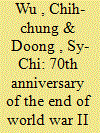

|
|
|
|
|
| Summary/Abstract |
In the closing stages of the Second World War, the world was divided into the capitalist side led by the United States and the communist side commanded by the USSR. A new bipolar structure called the “Cold War” was gradually established in the second part of the twentieth century. Basically this “cold” war structure was maintained between the two superpowers in the major areas of the world like Europe, but neither in the Korean peninsula nor in Vietnam, nor in Taiwan Strait since several “hot” wars took place in these regions.1 During that period, South
Korea, South Vietnam and Taiwan all had the support of the United States to resist the military threat of the other side supported by the communist USSR and China. Later, the capitalist South Vietnam was unable to resist the invasion of the North and collapsed. On the other hand, South Korea succeeded in developing the strength of the country and became a major middle power in the world. For strategic reasons, Taiwan lost formal political recognition of the world to the
profit of Communist China, but continues to flourish until now. The two Vietnams and the two Koreas all have similar sizes in term of territory and population. By contrast, China is 268 times larger than Taiwan calculated by territorial size, 60 times bigger by population power, and is actually the second largest global economic power after the United States. Without diplomatic allies, besides some smaller states, Taiwan still continues to prosper with its special security strategy. Seventy years after the end of the Second World War, this article aims to provide an understanding of the geopolitical strategy of Taiwan that continues to guarantee its future.
|
|
|
|
|
|
|
|
|
|
|
|
|
|
|
|
| 2 |
ID:
087661


|
|
|
|
|
| Publication |
2009.
|
| Summary/Abstract |
Why a combatant command for Africa? I argue that AFRICOM was formed to implement the U.S. national security strategy that seeks to strengthen states and eliminate ungoverned space, as well as establish relationships with African states that offer a means to greater state stability and foster economic development. In so doing, it counters global jihadist by denying them haven among weak governments or in ungoverned areas. It protects U.S. interests in resources by helping governments become more stable. And it competes with the Chinese approach that could worsen the status quo of ineffective states and ungoverned space. Indeed, the U.S. approach of increasing state effectiveness makes African countries less susceptible to the problems that may arise from the Chinese approach and so serves China's interests in access to natural resources.
|
|
|
|
|
|
|
|
|
|
|
|
|
|
|
|
| 3 |
ID:
107149
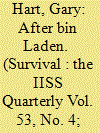

|
|
|
|
|
| Publication |
2011.
|
| Summary/Abstract |
The Cold War ended 20 years ago. NATO has yet to define a twenty-first- century mission. New allies and new rivals are emerging. There are new security threats that do not lend themselves to military response and that cannot be addressed either by old alliances or by the United States alone, and the nature of warfare and the character of conflict themselves are changing. The United States' national predisposition, however, has been to rely on traditional institutions and policies and to use them to address unfolding history on its own timetable.
|
|
|
|
|
|
|
|
|
|
|
|
|
|
|
|
| 4 |
ID:
126774
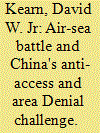

|
|
|
|
|
| Publication |
2013.
|
| Summary/Abstract |
The challenge presented by china's military modernization has seemingly altered the conventional balance in the western pacific, with significant implications for U.S. national security policy, and, thus, deserves the focus of planners and decision-makers.
|
|
|
|
|
|
|
|
|
|
|
|
|
|
|
|
| 5 |
ID:
109107
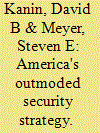

|
|
|
| 6 |
ID:
061863


|
|
|
| 7 |
ID:
133366


|
|
|
|
|
| Publication |
2014.
|
| Summary/Abstract |
Two years ago, at our NATO Summit in Chicago. NATO leaders endorsed the review of NATO's deterrence and defence posture (D&DP).
|
|
|
|
|
|
|
|
|
|
|
|
|
|
|
|
| 8 |
ID:
132333


|
|
|
|
|
| Summary/Abstract |
The ambition of this special issue is to contribute to contemporary scholarly analyses of border security by bringing more focus onto a specific field of inquiry: the practices of the plurality of power-brokers involved in the securing of borders. Border security is addressed from the angle of the everyday practices of those who are appointed to carry it out; considering border security as practice is essential for shedding light on contemporary problematizations of security. Underscoring the methodological specificity of fieldwork research, we call for a better grounding of scholarship within the specific agencies intervening in bordering spaces in order to provide detailed analyses of the contextualized practices of security actors.
|
|
|
|
|
|
|
|
|
|
|
|
|
|
|
|
| 9 |
ID:
132334


|
|
|
|
|
| Publication |
2014.
|
| Summary/Abstract |
The ambition of this special issue is to contribute to contemporary scholarly analyses of border security by bringing more focus onto a specific field of inquiry: the practices of the plurality of power-brokers involved in the securing of borders. Border security is addressed from the angle of the everyday practices of those who are appointed to carry it out; considering border security as practice is essential for shedding light on contemporary problematizations of security. Underscoring the methodological specificity of fieldwork research, we call for a better grounding of scholarship within the specific agencies intervening in bordering spaces in order to provide detailed analyses of the contextualized practices of security actors.
|
|
|
|
|
|
|
|
|
|
|
|
|
|
|
|
| 10 |
ID:
097055
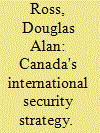

|
|
|
| 11 |
ID:
097056
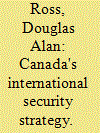

|
|
|
| 12 |
ID:
127616


|
|
|
|
|
| Publication |
2014.
|
| Summary/Abstract |
Armed conflict liquidated Central America's dictatorships by the end of the twentieth century. Only Costa Rica was democratic when a wave of civil wars broke out in the 1970s; by the mid-1990s, every country on the isthmus had replaced dictators or military juntas with elected presidents and legislators. Every nation in the region now allows adults at least 18 years old (or 16, in Nicaragua) to cast ballots in regularly scheduled elections
|
|
|
|
|
|
|
|
|
|
|
|
|
|
|
|
| 13 |
ID:
075440
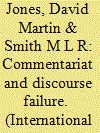

|
|
|
| 14 |
ID:
098282
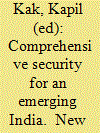

|
|
|
|
|
| Publication |
New Delhi, KW Publishers, 2010.
|
| Description |
xxix, 394
|
| Standard Number |
9789380502304, hbk
|
|
|
|
|
|
|
|
|
|
|
|
Copies: C:1/I:0,R:0,Q:0
Circulation
| Accession# | Call# | Current Location | Status | Policy | Location |
| 055172 | 355.033054/KAK 055172 | Main | On Shelf | General | |
|
|
|
|
| 15 |
ID:
146994
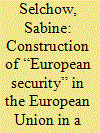

|
|
|
|
|
| Summary/Abstract |
In June 2015 High Representative Mogherini presented her strategic assessment The European Union in a changing global environment as the express point of reference for the new EU Global Strategy. Grounded in the premise that this assessment is not simply a description of the state of the world but plays into the construction of social reality, this article sets out to understand the openings and closings of possibilities that it holds. My analysis generates a number of concrete insights, ranging from insights into the distinct nature of the challenges the EU is facing, to the discovery that there is no “existential threat” and the importance of “regions” as a guiding category. Grounded in an understanding of the world as being reflexive modern, I interpret these findings as displaying an intriguing and paradoxical interpretive disposition. On the one side, there is a notable opening towards unconventional conceptions of the world; on the other side, there is a symbolic conservation of existing EU institutions and programmes and a reproduction of modern premises. I argue that it is the first aspect that makes the document significant: Mogherini’s strategic assessment opens an important discursive space to think (European) security anew.
|
|
|
|
|
|
|
|
|
|
|
|
|
|
|
|
| 16 |
ID:
170591
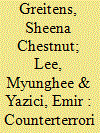

|
|
|
|
|
| Summary/Abstract |
In 2017–18, the Chinese Communist Party (CCP) changed its domestic security strategy in Xinjiang, escalating the use of mass detention, ideological re-education, and pressure on Uyghur diaspora networks. Commonly proposed explanations for this shift focus on domestic factors: ethnic unrest, minority policy, and regional leadership. The CCP's strategy changes in Xinjiang, however, were also likely catalyzed by changing perceptions of the threat posed by Uyghur contact with transnational Islamic militant groups in Southeast Asia and the Middle East, and a corresponding increase in perceived domestic vulnerability. This threat shifted from theoretical risk to operational reality in 2014–16, and occurred alongside a revised assessment that China's Muslim population was more vulnerable to infiltration by jihadist networks than previously believed. Belief in the need to preventively inoculate an entire population from “infection” by these networks explains the timing of the change in repressive strategy, shift toward collective detention, heavy use of re-education, and attention paid to the Uyghur diaspora. It therefore helps explain specific aspects of the timing and nature of the CCP's strategy changes in Xinjiang. These findings have implications for the study of the connections between counterterrorism and domestic repression, as well as for authoritarian preventive repression and Chinese security policy at home and abroad.
|
|
|
|
|
|
|
|
|
|
|
|
|
|
|
|
| 17 |
ID:
046155


|
|
|
|
|
| Publication |
London, ASEAN Academic Press, 2001.
|
| Description |
104p.
|
| Standard Number |
1901919366
|
|
|
|
|
|
|
|
|
|
|
|
Copies: C:1/I:0,R:0,Q:0
Circulation
| Accession# | Call# | Current Location | Status | Policy | Location |
| 046604 | 355.4595/RAZ 046604 | Main | On Shelf | General | |
|
|
|
|
| 18 |
ID:
137231
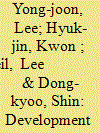

|
|
|
|
|
| Summary/Abstract |
This paper intends to propose countermeasures against increasingly sophisticated North Korean cyberterrorism through analysis of the cyber attack carried out by North Korea on March 20, 2013, which targeted South Korea’s major television stations and financial institutions, and also the attack of June 25, 2013, which was directed at South Korea’s government. These cyber attacks not only caused South Korea’s major television stations and banks to suffer from frozen computer terminals,
but also paralyzed websites including those belonging to the Presidential Office, the Prime Minister’s Office, government institutions and local media companies. This article addresses, firstly, the reasons why cyber attacks are now targeting the websites of media companies and financial institutions, whereas in the past they were intended to paralyze the national government by means of DDoS attacks. Secondly, the article attempts to predict the kinds of attack that can be expected in the future. Thirdly, in order to ensure that there are sound defenses against the continually growing threat of cyber terrorism, the article proposes an optimal system of countermeasures, describing related regulations, response strategies, and security personnel.
|
|
|
|
|
|
|
|
|
|
|
|
|
|
|
|
| 19 |
ID:
127622
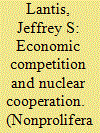

|
|
|
|
|
| Publication |
2014.
|
| Summary/Abstract |
The number of bilateral nuclear cooperation agreements surged during the "nuclear renaissance" of the past decade. This proliferation is only partially explained by the prevailing approaches that focus on strategic imperatives. To supplement these explanations, this study draws on neoliberal models of economic competition to posit that bilateral agreement negotiations also exhibit conditions of "uncoordinated interdependence" and maneuvering to gain market share. Case evidence suggests the contours of supplier state bids for civilian assistance are determined at least as much by considerations about economic competition as they are by positive strategic goals. In addition, this study identifies several cases of cooperation where there appears to be little or no strategic motive for export agreements. The study concludes that patterns of economic competition and the influence of peers in defined competitive spaces alter material payoffs and impact policies. It also identifies a surprising role for principled restraint in dampening strategic and economic competition in some dyads.
|
|
|
|
|
|
|
|
|
|
|
|
|
|
|
|
| 20 |
ID:
131057


|
|
|
|
|
| Publication |
2014.
|
| Summary/Abstract |
The paper investigates how states manage multiple rivalries when faced with immediate threats. We argue that accommodation of one rival allows states to shift resources from the management of another rival to deal with the costs of immediate threats. By examining enduring rivalries from 1966 to 1999, we show that states' reliance on accommodation in response to threats varies depending on the number of severe threats and the relative capabilities between the states and the threat-issuing rivals. Findings show that when faced with severe but few threats, states prefer to accommodate rivals that did not issue the threat. They are also more likely to give larger concessions to such rivals and to those issuing less severe threats. Finally, the greater the military capability of a rival issuing a severe threat relative to that of the challenged state, the more likely that a threatening rival is accommodated.
|
|
|
|
|
|
|
|
|
|
|
|
|
|
|
|
|
|
|
|
|